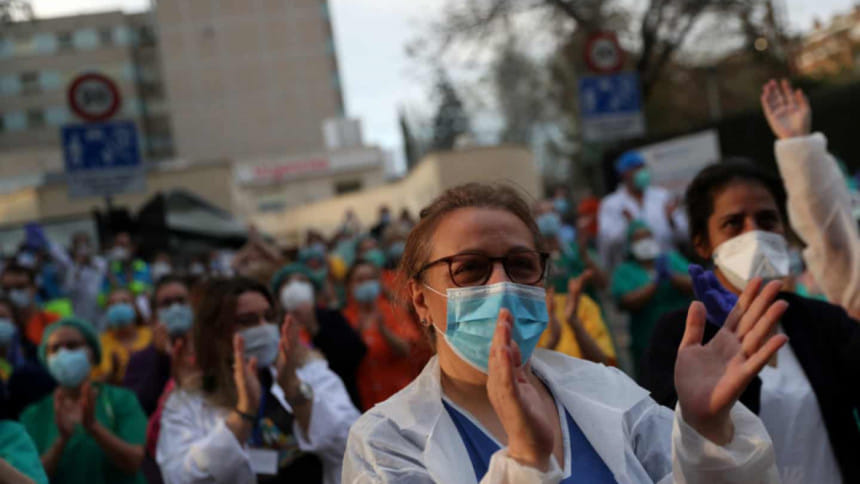How crisis awakens altruism in humanity

Beginning in December in China's Wuhan City, the highly infectious COVID-19 has crossed boundaries and oceans with supersonic speed. It has already claimed more than 83,000 lives, with one million and a half infected so far. In the process, the world has come to a standstill. The numbers of deaths and confirmed cases are rising by leaps and bounds. No one knows when this will end.
Obviously, Covid-19 has shaken the global economic and social fabric to its core. Economists are predicting a re-run of the 1930s' Great Depression. But unlike then, the third wave of globalisation beginning in the 1990s created a complex web of interdependence. With the global supply chains located across continents, companies are wired into a complex web of production networks, having little or no autonomy over individual units. Thomas Friedman in his book The World Is Flat in 2005 wrote about a world growing increasingly flatter and interconnected, when most of the latest social media instruments like Facebook, Skype, Twitter or Linkedin were not even in sight. Since then, all these connectivity tools really wired the world, making it truly interdependent and rendered national boundaries somewhat irrelevant.
The impacts of this unfolding peril on our economies will thus be far-reaching. ILO estimates that about 25 million workers will face unemployment. To face this exponentially rising mortal threat, governments, rich and poor the world over, have announced stimulus packages to support the working people and the economy. The prime minister of Bangladesh has also announced a sizable package, but compared to the needs, it may prove to be inadequate. For example, over 85 percent of our active labour force—i.e. more than 50 million people—work in the informal sector, who have no social protection or employment benefits.
But government efforts alone will not suffice. Crises like that of the coronavirus have historically brought out the latent side of humans, i.e. altruism—sacrificing self-interest to benefit others. The 72-year-old Italian clergy who embraced death refusing the ventilator for himself, urging instead that it be given to a young infected, is a shining example of altruism. Globally, many foundations, charities and individuals are coming up with big amounts to support the most vulnerable. Even in India or Bangladesh, which are low-income countries, several big businesses and organisations have announced huge contributions to face the current crisis. individuals from different sectors are coming up with donations for the poor.
Actually, this unprecedented pandemic should be taken as a wake-up call to expose the basic organising principle that our societies and economies today are founded on, namely the rational actor model based on maximising individual self-interest. This western model, led by the US, had its contagious effect in the developing economies. American education is excellent in imparting scientific knowledge and technical skills, but the rational actor model tends to create "rational fools" (an article with this title was written by Amartya Sen in 1977). Human beings are not motivated purely by selfishness; they also have altruistic genes. They are not just calculating automations, they do not always think logically, but emotionally and socially as well. But American education tends to undervalue such ethical/moral teachings. This explains why the American rich always resist progressive taxation, but Scandinavians don't grumble against such taxation and the polluter-pays principle. The Nobel prize winning economist Joseph Stiglitz, with his writings including The Price of Inequality (2012), keeps warning the Americans about the dangers of rapidly increasing disparity in their society.
It may be recalled that Adam Smith, the father of classical economics, wrote the Theory of Moral Sentiments back in 1759, 17 years before publishing the Wealth of Nations. In the former, Smith argued that each human has a Man within, brave enough to stand in adversity, as a higher call to maintain self-dignity/respect. Though he postulated that the "invisible hand" of market will ensure collective good, his understanding was that rational actors will play fair, guided by moral values. So Smith's economics had a strong normative lens (what should be), but his genetically-muted descendants overwhelmingly focused on positive economics (what is), separating the "should be" part from human behaviour.
Actually, the philosophical debate on whether competitive or cooperative genes dominate in human nature goes back to centuries. We are familiar with the cut-throat competition-based models of Hobbs-Darwin vs the cooperative models of Rousseau and others. Even the experiments under game theory (a tool of neoclassical economics) show that ultimately cooperation pays off better than purely individual decisions. Karl Polanyi in his classic The Great Transformation (2001) argued that economics and culture co-evolve, impacting each other. So cultural values of a society matter in shaping individual behaviour. In many indigenous societies, private property is not a culture even today. Actually, the idea of private property and wealth accumulations were absent in much of human history. So it is hard to argue that these artefacts are in-built, inherent in human genes. With already negative population growth in many countries, coupled with rapidly developing nanotechnologies and increasing mass production, it is plausible that in a few centuries, private property may again be irrelevant soon!
Obviously, behavioural economists increasingly question the standard view of human self. Hundreds of experiments show that most people are pro-social, preferring to sacrifice in order to benefit others. In recent years, due to increasing concerns particularly about environmental sustainability, development engineers, with assistance from psychologists, have been focusing on better understanding of human behaviour. The World Bank has named its 2015 annual report as "World Development Report: Mind, Society and Behaviour". After so many decades of promoting market economy along with the neoclassical model of rational choice, the World Bank has come to terms with the limitations of such a lens.
So, while practicing altruistic interdependence at this moment of crisis, let us internalise the fact that human beings are not individual atoms; our societies, our relationships and our germs have little degrees of separation, from each other and from the Mother Earth. This is what Ecological Economics, in which I was a Fellow in the mid-1990s, teaches us. Let us refocus on our age-old values of collective care, as we infect each other with both ills and joys. Infectious diseases like Covid-19 is a useful reminder of our interdependence and interconnectedness. At this perilous moment, we need morally authoritative global leaders who will advise not just on how to wash our hands, but inspire the better angels to come out of our Being.
Mizan R. Khan is Deputy Director at ICCCAD, Independent University, Bangladesh, and Program Director at LDC Universities Consortium on Climate Change (LUCCC).

 For all latest news, follow The Daily Star's Google News channel.
For all latest news, follow The Daily Star's Google News channel. 



Comments